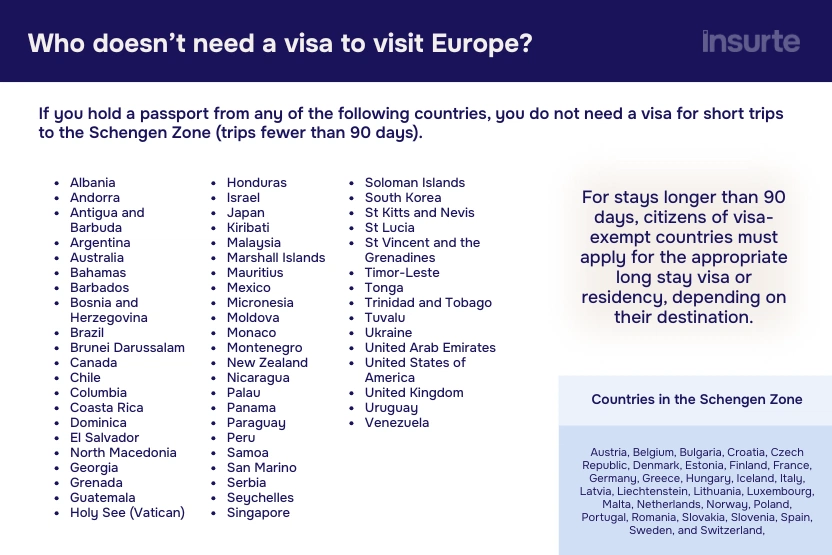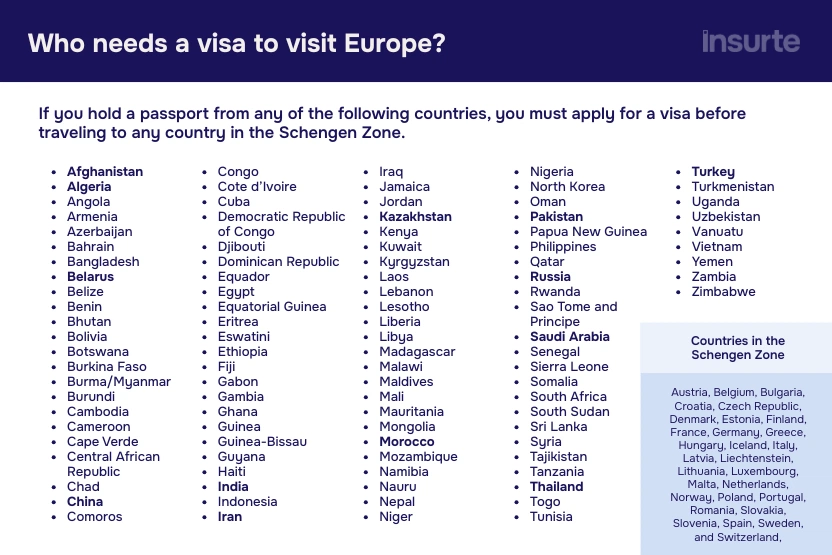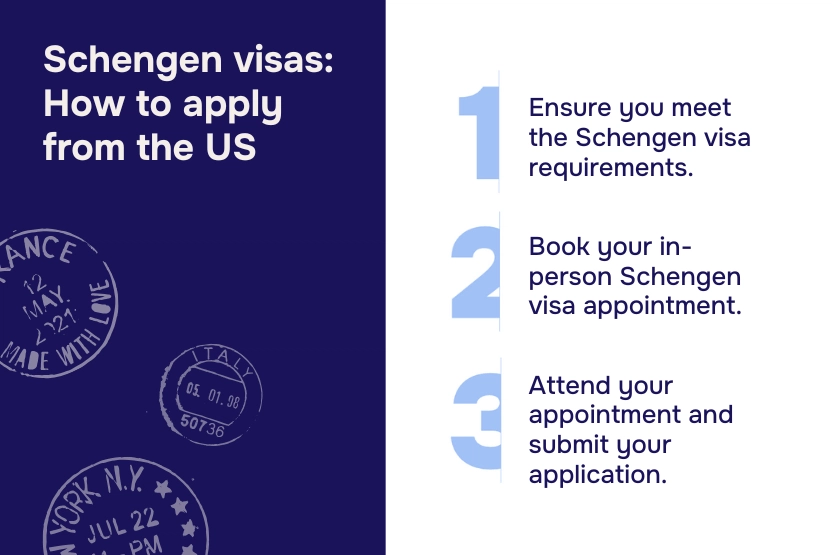
Traveling to Europe with a US Green Card: Visa Rules & More
Sarah Pardi - February 6, 2026
Home > Travel Requirements, Policy & Authorization > Traveling to Europe with a US Green Card: Visa Rules & More
Share this post
Understanding the entry requirements for a place you want (or need) to travel to can seem complex enough, and that's without the added layer of existing visas and residency.
What is required of you to visit France or Spain? Or any of the other European countries in the Schengen zone? And what if you hold a valid US Green Card? Are the requirements different?
Don't worry. We are here to answer everything you need to know about traveling to Europe as a Green Card holder.

Going to Europe with a Green Card
If you hold a valid Green Card for the US, you are likely wondering if you can use it to travel to Europe visa-free. Unfortunately, the answer is no. This doesn't necessarily mean you need a visa, however.
In order to travel to Europe without a visa, your passport is what matters, not your residency (with one exception, which we will talk about in just a minute).
A valid Green Card denotes your right to stay in the US. While this does allow you to live and work in the States, it doesn't give you all of the same privileges that US citizens have.
Heading to Europe?
Make sure you have the right travel insurance.
US citizens (among citizens of several other countries) do not need to apply for a visa to visit Europe for short stays. In this context, a short stay is anything less than 90 days. They hold visa-exempt status.
Some of the other countries that are visa-exempt include the UK, Canada, Australia, Mexico, Japan, and several others. This means that they, too, can enjoy visa-free travel to Europe.
Citizens of these countries get to go to Europe without a visa thanks to agreements that their governments have with one another.

Citizens vs residents
Where the confusion happens is between citizens and residents.
In order to take advantage of a country's visa-exempt status, you must be a citizen of that country, not just a resident.
This would mean that you have applied for citizenship, it has been granted, and you hold a valid US passport. If you have a valid US passport, you can travel to Europe without a visa.
While a Green Card is a step towards citizenship for many, it doesn't qualify you for visa-free trips to Europe.
All of that said, it is possible to be a US Green Card resident and be a citizen from a visa-exempt country.
For example, if you are a Mexican citizen with a Mexican passport and have a US Green Card, you can visit Europe without a visa.
Why? The kicker isn't your US Green Card; it's your Mexican passport.
Due to an agreement with the Schengen area, Mexican citizens get to enjoy visa-free travel to Europe. In this specific example, whether you hold a US Green Card or not, you can travel to Europe (for short stays) without a visa.
On the other hand, if you are not a citizen of a visa-exempt country, you will need to apply for a visa to visit Europe, even if you hold a valid Green Card.
For instance, if you are a Chinese citizen with a US Green Card, you will still need to apply for a visa to visit Europe. Again, because visa conditions depend on your citizenship, not your residency.

Did you know?
Travel insurance is mandatory for Schengen visa applicants. Get yours today.
The one exception
If you remember, we did say that there is one exception.
If you are a citizen or resident of a country in the Schengen area, you do not need an additional visa to travel through the zone.
This means that if you hold both a US Green Card and a valid residence permit in a Schengen country (such as France), you can generally travel to other Schengen countries without applying for a visa. The same is true if you are currently a citizen of a Schengen country.
That said, if this is the case for you, always check the conditions of your specific visa or circumstance, as there can be limitations.
Applying for a Schengen visa in the US
If you are a US Green Card holder and are a citizen of a country that isn't exempt, you will need to apply for a Schengen visa before traveling to Europe.
Luckily, you can do this in the US!
The US has several European embassies, consulates, and visa processors at the ready, allowing you to apply for a Schengen visa to head to Europe.
Applying for a Schengen visa from the States requires a few simple steps.

- Make sure that you meet the Schengen visa requirements. You can learn more about those here.
- Second, book your Schengen visa appointment. Currently, these appointments are mandatory and must be attended in person.
- At your appointment, submit your completed application.
After submitting your application at your regional visa application center, processing typically takes around 15 days (just a heads-up, it can be higher during peak seasons).
While visa applications and processes can feel stressful, once you know what is expected of you and what you need to do, the experience can feel much less daunting.
We're here to help. Make sure you follow the Travel Guide for all of the latest European travel news and inspiration.
FAQs
Sources
General information: https://www.uscis.gov/green-card/after-we-grant-your-green-card/international-travel-as-a-permanent-resident
Applying for a visa?
Check out some of our most-read visa guides.
Related posts
Upcoming travels ? Get Insured !
Find the right insurance for your trip by using our powerful comparison tool!
Sarah Pardi - February 19, 2026
Sarah Pardi - February 13, 2026
Sarah Pardi - February 12, 2026
Sarah Pardi - February 6, 2026





